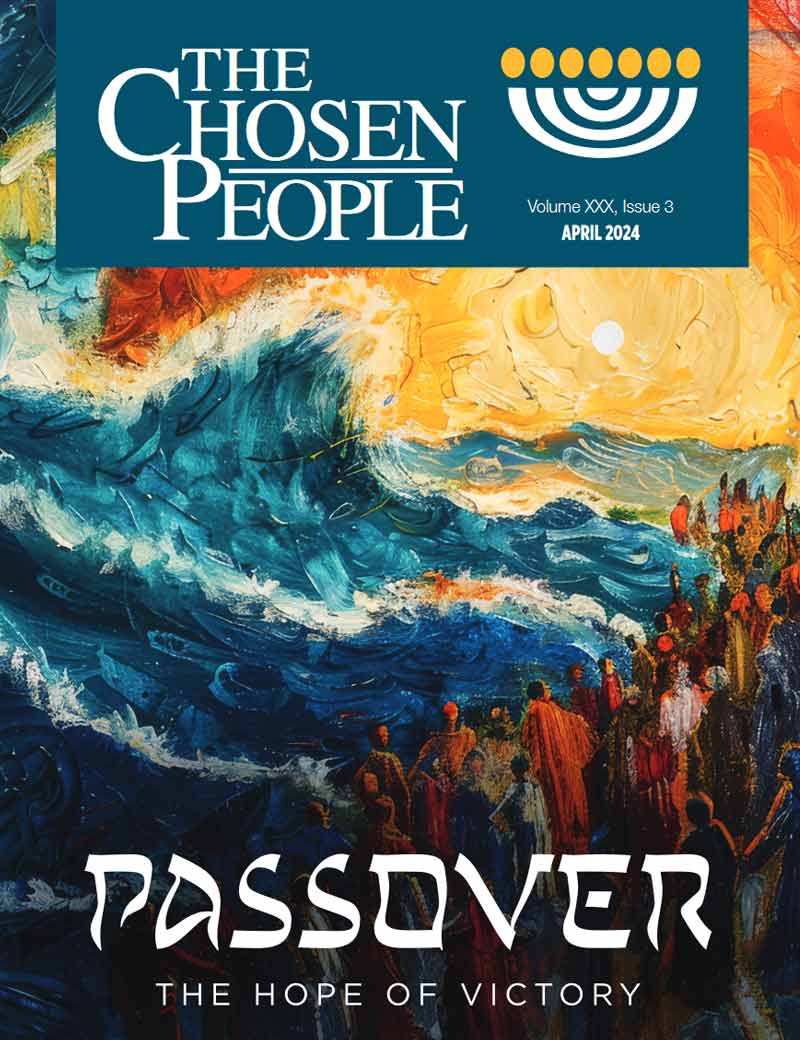For thousands of years, Jewish people have celebrated Passover, remembering God’s deliverance of the Israelites from slavery in Egypt and His faithfulness over the centuries. This month, millions of Jewish people worldwide will gather around the table to recount the story of the exodus. But thousands of seats will be empty for those with loved ones who died in the October 7 massacre or in combat, who are still held hostage, or who are serving in the military. The ongoing conflict between Israel and those who seek her destruction will weigh on many hearts at this time of year.
Since last Passover, antisemitism and anti-Israel sentiment around the world have skyrocketed. Yet, Passover is still a sign of hope and God’s faithfulness, as a moving and always relevant section of the Passover liturgy testifies: “Since it is not [only] one [person or nation] that has stood [against] us to destroy us, but rather in each generation, they stand [against] us to destroy us, but the Holy One, blessed be He, rescues us from their hand.” Like all those who rose up against Israel in the past, Israel’s current enemy, Hamas, will fail.
Throughout history, Jewish people have celebrated Passover during perilous times, including the Holocaust in Europe and Palestinian uprisings in Israel.
Here are some encouraging stories about celebrating Passover during dark days from Jewish people our ministry continues to serve.
Passover during the Holocaust
One of the Holocaust survivors our ministry in Israel serves turned one hundred years old last year! We met him ten years ago and learned his amazing story. He went through the entire Second World War as a Soviet soldier and was even captured. Since he was Jewish, the Germans wanted to send him to a concentration camp, but he and a group of young men managed to escape. When we asked him about Passover during the war, he told us this story:

At that time, we (Jewish Soviet soldiers) were all communists, and it was not customary to celebrate religious holidays. But in 1945, we were in Germany. It was April, and we, several Jews from Ukraine, decided to celebrate Passover since this could be the last holiday for each of us. We had nothing, no matzah [unleavened bread], no wine. But we lit candles. One of us knew a few prayers, and we repeated after him. Everyone remembered what they had heard from their parents about Passover, and we tried to retell the whole story.
But the most memorable words were: “Next year in Jerusalem!” It was difficult for me, as a Soviet soldier, to dream about Jerusalem or Israel at that time. But these words entered my heart so deeply that for many years, though I never fully celebrated Passover again, every year during that time, I said to myself, “Next year in Jerusalem.” I didn’t believe that I would ever see Jerusalem, but in 1990, I was able to leave for Israel, and I have been living in this beautiful country for more than thirty years. For me, Passover will always be a holiday of hope and faith.
Another Holocaust survivor we serve was born in Czechoslovakia. She survived a ghetto and a concentration camp. In 1943, when she was nine years old, she and her mother were part of a group of Jewish people taken to the Stutthoff concentration camp in Poland. Men and women were separated, and many children were separated from their parents and placed in different barracks. Thankfully, she and her mother ended up in the same one and survived together. These are her words about Passover in the camp:

I remember one day, someone said, “Today is Passover.” Nobody knew whether this was true since we didn’t have calendars. I remember everyone was in a particular mood, and a group of Jewish women sang songs. I was a child, and one woman came up to me and gave me a potato, saying, “We don’t have matzah, but someday we will be free and will celebrate Passover in Jerusalem.”
The potato was a priceless treasure for me. Of course, I didn’t believe I would survive or ever be in Jerusalem. But God has His plan, and today, I live there. Every time I celebrate Passover, I remember that woman, the potato, and the words that we will be free.
Passover at the Birth of Israel
Our ministry serves another woman who was born in the land of Israel in 1939. She remembers her family celebrating Passover in 1948, just a month before Israel declared independence. She recalls how primarily women observed Passover at home then because the men were away, serving in the army. She describes how her faith in Jesus, the Messiah, brought meaning to Passover:

For me, Passover has always been a memorable holiday of God not abandoning His people. After the
Holocaust, many people from Eastern Europe who had gone through camps and ghettos began to arrive in Israel. There were children with numbers on their forearms who recounted terrible things, yet still, Passover was a holiday of hope. I remember my uncle returned home, and all the women were happy. We lived in Hadera, and our neighbors also came to our Seder (Passover meal). As children, we were delighted we could have a tasty and satisfying meal. The adults were happy and sad simultaneously, and
everyone was waiting for the State of Israel to be established.
My parents, uncles, and aunts were religious. They went to synagogue and celebrated holidays; Passover was always one of the most important holidays in our house. But the older I got, the more holidays became unimportant to me. When I started a family, Passover became just a meaningless family tradition for us. Everything changed when, eight years ago, I recognized Messiah Yeshua (Jesus). In recent years, we have been joyfully celebrating Passover and understanding its true meaning—the sacrifice of the Passover Lamb!
Passover during the Second Intifada
The Second Intifada (Palestinian uprising) in Israel started at the end of Rosh Hashanah (Jewish New Year) in September 2000. It began with attacks on Jewish Israelis in the population centers of Tel Aviv, Haifa, and Jerusalem. From there, it spread throughout the country. The most lethal aspect was the suicide bombers, who would target public buses and various facilities. They aimed to inflict death and destruction on Israeli citizens as they went about their daily business. One of our staff in Israel recalls celebrating Passover in 2002:

My wife and I were living in the Tel Aviv area with our two sons. Our older son entered the Israel Defense Forces (IDF) in October 2001, so during Passover 2002, he was not with us as he was on guard duty at his base. I remember how Passover eve felt incomplete as we did not have our whole family together. Also, with an increase in terror attacks and bus bombings, it was a somber time in Israel. Still, we observed the Passover and commemorated God’s deliverance from Egyptian bondage thousands of years ago.
After our Seder, we turned on the news to be devastated by the report of a Hamas terrorist attack at the Park Hotel in the Israeli coastal city of Netanya. It was the deadliest attack against Israeli citizens during the Second Intifada. The next day, then-Prime Minister Ariel Sharon declared a state of emergency and launched Operation Defensive Shield to root out the terrorists. Eventually, those responsible for the Park Hotel massacre and other acts of terrorism were arrested.
We remember the solemn days of Passover 2002, the horrors of that massacre, and the many dear people and friends who died during the Second Intifada. But we also remember the saving hand of the Lord God, who redeemed our people from bondage to Pharaoh.
We remember the even greater redemption during a Passover two thousand years ago when Yeshua died and rose from the dead to be the redeeming Messiah. We yearn for the day when Yeshua will return to Israel and complete the redemption of Jews and Gentiles that began so long ago. During these grim days of the current war, our prayer is the same as the first followers of Yeshua, “Come quickly, Yeshua, come quickly.”
Please pray for Israel and Jewish people everywhere celebrating this biblical festival this month. As families recount the Exodus story, may Jewish people see God is mighty to save in every generation. This Passover, we also pray many will recognize and turn to Jesus, our Passover lamb. “Behold, the Lamb of God who takes away the sin of the world!” (John 1:29).

Sign up to receive our email newsletters
Get the latest news from Israel, insights from Dr. Mitch Glaser, international ministry reports, as well as videos and podcasts, downloadable resources, discounts in our online store, and much more!
